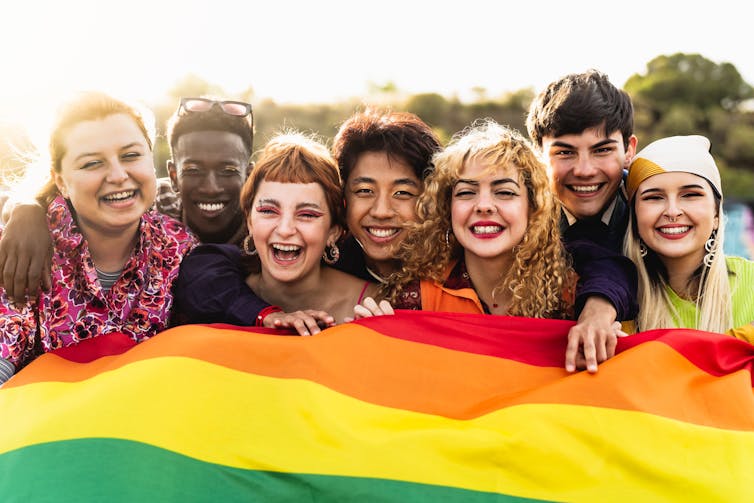An Alberta court recently ruled in the case of a Calgary man, Matthew Mills, who ran a private club out of his home for people who identify as non-monogamous. Mills was charged for a zoning violation — he was accused of operating an unsanctioned “social organization” in a residential area.
Mills claimed that the charges against him infringed on his right to define his identity in his own way. This is because, as he told the court, he is “involved in ethical non-monogamy as a core aspect of his lifestyle” and that he “considers his views and preferences in this regard to be part of his sexual orientation.”
The court decided that Mills could continue hosting the event, but could not continue to brand it as a club. The judge said “personal sexual expression, in all its many-splendored forms, is a fundamental aspect of human life, experience and fulfillment. Legislative or other state restrictions targeting legal, consensual, private sexual activity will attract close Charter scrutiny.”
The court did not go as far as Mills wanted it to. It declined to recognize polyamory as a protected category under the Charter. However, in the near future, the courts may not be so hesitant. Nor should they be. As this case shows, sexual identity is central to people’s conceptions of themselves. It is just as important as traditional sources of identity such as religion — and it deserves the same level of protection.
How sex became an identity
Sexual identity is not only a matter of our sexual orientation or gender identity — as important as these still are. People increasingly also define themselves with reference to things like kinks, non-monogamy and asexuality, as well as less familiar categories such as ecosexual and digisexual.
This idea that a person’s sexuality can be an integral part of their identity, of their sense of “who I am as a person” is still quite new.
Before the 19th century, people did not think sexual behaviour reflected some essential feature of an individual. Sex was just something you did. This is not to say sex acts were morally neutral, or that they were left unregulated. Both church and state kept a close eye on people’s private behaviour. However, even if you transgressed the society’s many restrictions, your sexual behaviour did not determine your identity.

This changed in the late 19th century, when psychologists began to categorize people according to the gender of the person they were attracted to. This was not at first a great advance, since same-sex desire was considered by many of these early psychologists to be a pathology. But as the result of a long struggle by gay and lesbian activists, being gay became something to be proud of, and it is now an identity protected by law.
In the last few decades, other sexual identities have become more visible, and the people who define themselves with reference to them have started to demand similar recognition.
We should embrace these new, various sources of sexual self-definition. It is one of the great virtues of living in an accepting, tolerant society, that we can define ourselves and our sense of self on our own terms, without the state passing judgment on how we chose to do it.
Read more: How a digital archive is preserving Canada's history of LGBTQ+ activism
The backlash
There are those who disagree. They view the demands for recognition by sexual minorities as dangerous. After former New York governor Andrew Cuomo’s daughter, Michaela Cuomo, came out as demisexual (demisexuals prefer to have sex within the context of an intimate relationship), the conservative commentator Ben Shapiro railed against what he called “neo-identities.” He said: “The country does not have a future with this kind of stuff, it just does not.”
Shapiro worries that young people have been told that there are “only victims and victimizers in American society” and that they are therefore seeking out, or even creating, minority identities for themselves specifically in order to join the “coalition of the oppressed.” Trendy new sexual identities give them, he thinks, something to latch on to for this purpose.
But people like Mills are not making extravagant demands in order to promote their own victimhood. They are asking for the social recognition, along with the basic legal protections, we already offer a wide range of other groups.
Mills compared his legal claim to what would be offered to members of a minority religion. In explaining his ruling, the judge wrote:
The Applicant argues that his belief in ethical non-monogamy is a sincerely held, profoundly personal belief, governing his perception of himself and how he should live. As such, he claims that these beliefs attract the protection of s 2(a) of the Charter, which enshrines “freedom of conscience and religion” as a fundamental freedom.
Indeed, the legal system affords recognition and protection to a very wide diversity of religious groups, including ones some people would dismiss as weird or marginal. So, why can’t our sexual identities also benefit from the same protection?

The value of diversity
Some in the LGBTQ+ community have resisted the idea that identities such as being polyamorous deserve recognition on par with sexual orientation. One worry is that, if people claiming a wide array of sexual identities all start seeking recognition, it will take the focus away from the on-going struggle for full equality for gays, lesbians and trans people, who have been long-standing targets of discrimination.
This concern, though understandable, is unfounded. Social toleration is not a finite resource, and neither are legal rights. A society that values racial diversity, for instance, does not, and need not, pick and choose which racial groups to accept.
On the contrary, the way to fight hatred against one group is to create a world where everyone is accepted. Toleration is not a stock of capital we spend down till it is gone. It is an investment that returns us dividends, and these dividends grow more generous the more we spend on it.
Protecting sexual identity in the same way we protect other identities, like religious beliefs, would lead to modest but important changes to our laws. People could no longer be fired from their job because they are kinky or non-monogamous, for instance. Their sexual choices could not be used against them in custody disputes. We might have to expand our definition of marriage further, to include multiple partnerships. Above all, we would send a powerful message as a society, by affirming the importance of sexuality in its wondrous diversity.

